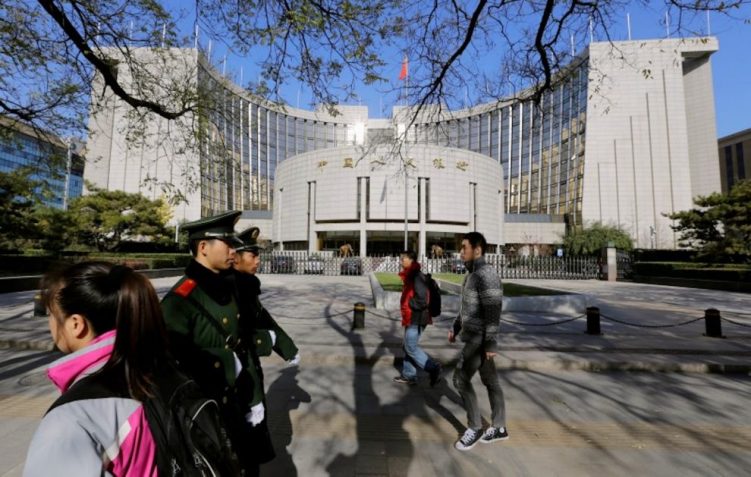The People’s Bank of China sprung a second surprise this week, by extending a loan on Thursday at steeply lower rates.
The move involved a medium-term lending facility (MLF) operation with the central bank issuing 200 billion yuan ($27.5 billion) in one-year loans at 2.30%, it said, which is 20 basis points below its previous MLF loan.
It left analysts thinking that policymakers want to provide greater monetary stimulus to the economy, as it came after the PBOC cut several benchmark lending rates on Monday, days after a top leadership meeting, which had outlined other major reforms.
ALSO SEE: China’s War on Wealth: Funds Staff Told to Repay ‘Excess’ Salaries
The central bank also injected 235.1 billion yuan into markets through seven-day reverse repos at 1.70% and said the cash injection through the short-term instrument was to “maintain reasonably ample month-end banking system liquidity conditions,” according to the statement.
Xing Zhaopeng, senior China strategist at ANZ said the MLF rate cut was “basically a reaction to the sharp declines in the stock market,” as China’s benchmark indexes have been falling this week.
China’s stock markets reacted negatively to the news on Thursday, taking the sudden urgency on the part of authorities to lend to mean that deflationary pressures and weakness in consumer demand are more severe than what is priced into assets. China reported weaker-than-expected GDP data earlier this month.
The Hang Seng China Enterprises index in Hong Kong, which tracks Chinese firms listed in Hong Kong, fell 1.6%, taking losses this month alone to 5%. Sovereign bond yields fell after the news of the MLF operation and rate cut.
Marco Sun, chief financial market analyst at MUFG Bank (China), said the cut in the policy rates could reduce the cost of financing and release cash. The unexpected MLF operation was also due to a large amount of MLF loans coming due, he said.
Routine MLF loan operations take place in the middle of each month. The PBOC’s operations last week resulted in 3 billion yuan being withdrawn, while leaving the interest rate unchanged.
Total outstanding MLF loans are above 7 trillion yuan, of which 4.68 trillion yuan are set to mature this year. The heavy amount of maturing loans has stirred speculation the PBOC may replace it with a permanent injection of cash via a cut to banks’ reserve requirements (RRR).
ANZ’s Xing said he expects the central bank to cut RRR in the fourth quarter to replace outstanding MLF loans.
Help for banks, which cut deposit rates
Some market analysts said Thursday’s rate cut was also a reaction to major lenders’ decision to lower deposit rates.
The Industrial and Commercial Bank of China (ICBC), Agricultural Bank of China (AgBank), China Construction Bank, Bank of China and Bank of Communications cut deposit rates by 5 to 20 basis points (bps), according to statements on their websites.
“It shows the PBOC wants to be more accommodating to banks in lowering their medium-term funding costs,” Gary Ng, Asia Pacific senior economist at Natixis, said.
“Cutting the MLF rate at a larger scale can help shield the net interest margin.”
The rate cuts also come ahead of a meeting of the Communist Party’s top decision-making body, or Politburo.
“In terms of the challenges facing the Chinese economy, rate cuts by themselves, particularly of this magnitude, are not really going to be that material,” ANZ’s head of Asia research Khoon Goh said.
“I think ultimately, given that the issues facing the property sector, the lack of confidence that is holding back consumer spending and confidence, all these need more concrete fiscal support or other types of policy measures to address.
“Interest rate cuts by themselves, particularly of the kind of magnitude we are seeing, are not going to really be effective enough.”
- Reuters with additional editing by Jim Pollard
ALSO SEE:
India Finance Minister Backs Call For Chinese Investment Return
China’s Quant Funds Hit Hard in First Half, as Crackdown Looms
China Secretly Built The World’s Fastest Supercomputers – WSJ
Hong Kong Still a Key Link in Illicit Chip Supplies to Russia
China’s Growth Slows in 2nd Quarter, Downturn Hits Retail Sales
Weak Factory, Property Data Highlights China’s Uneven Recovery
China Facing Reality Check After Long Boom Built on Debt
























